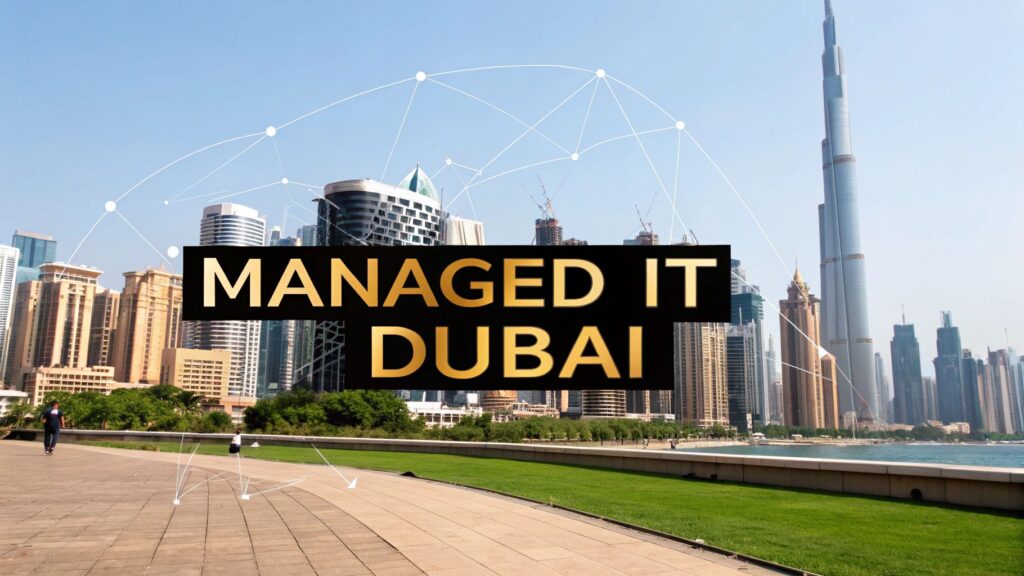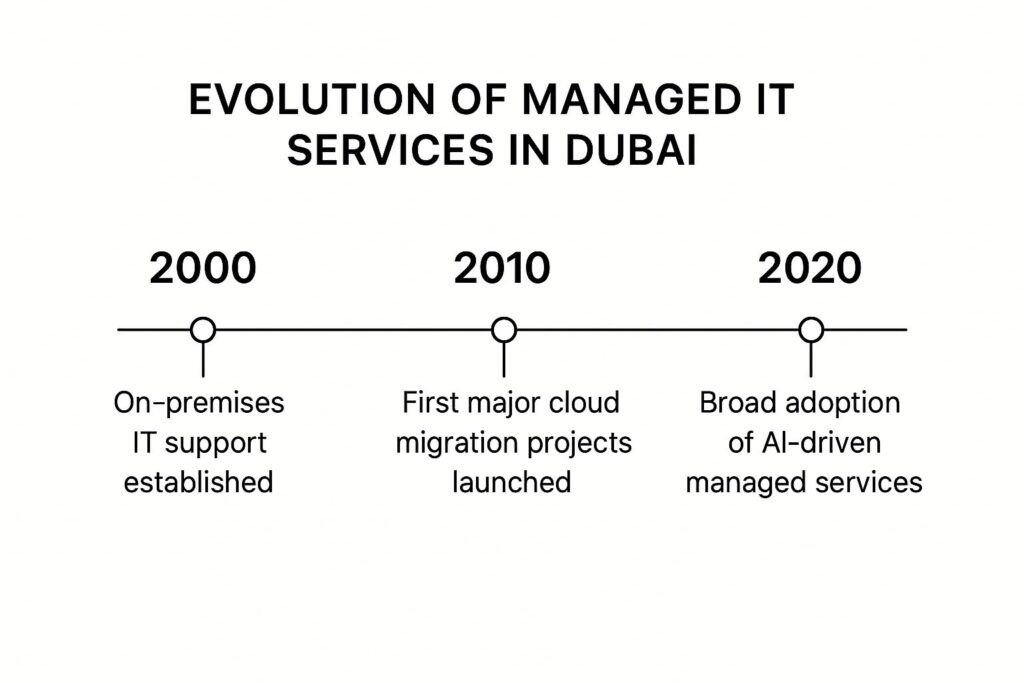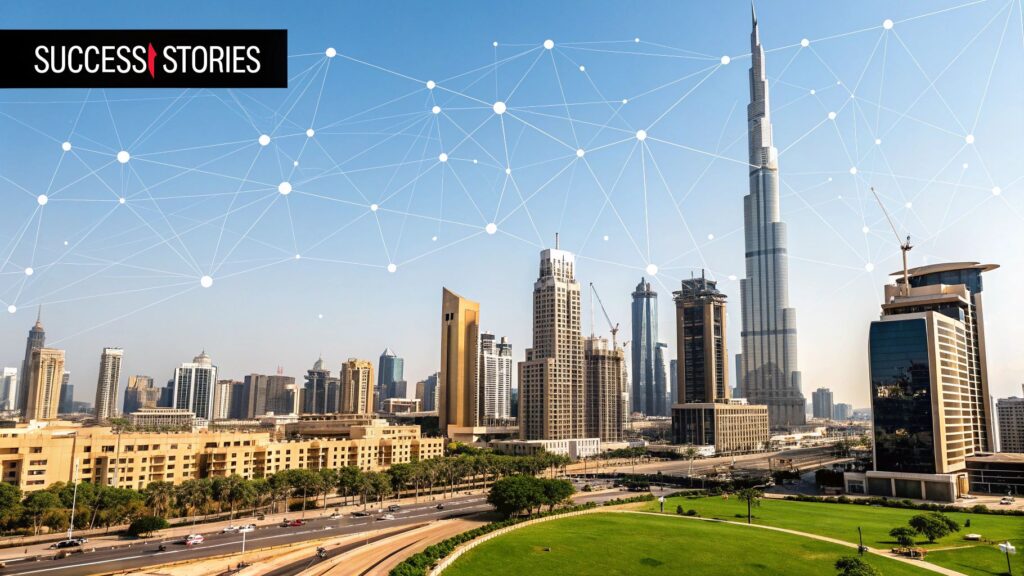
The Evolution of IT Services in Dubai’s Digital Landscape
Dubai’s emergence as a major technology hub in the Middle East is intrinsically linked to the rapid growth and adoption of managed IT services. These services have come a long way, evolving from simple technical assistance to become key drivers of business innovation across the emirate. This transformation mirrors a broader regional shift towards digital advancement, with initiatives like the Dubai Paperless Strategy playing a vital role. You might be interested in: Learning more about the UAE Digital Transformation Framework

The infographic above visually charts the key stages in this evolution. Around 2000, the focus was on establishing on-premises IT support. A decade later, cloud migration projects started gaining momentum. By 2020, the adoption of AI-driven managed IT services signaled a new era of advanced tech solutions.
From Reactive Support to Proactive Management
Initially, managed IT services in Dubai were primarily reactive, concentrating on troubleshooting existing IT issues. Businesses depended on these break-fix solutions, addressing technical problems as they occurred. However, this reactive model proved inadequate for companies looking to succeed in an increasingly competitive environment.
This need for more strategic IT solutions led to the rise of proactive managed services. Instead of simply reacting to problems, providers began offering services designed to prevent issues before they impacted business operations. This proactive approach involves regular system maintenance, security updates, and performance optimization.
The Rise of Cloud Computing and Cybersecurity
The adoption of cloud computing has been a major driver in the evolution of managed IT services in Dubai. Cloud solutions offer businesses greater flexibility, scalability, and cost-effectiveness. Moreover, they provide access to advanced technologies without substantial initial investments.
Along with cloud computing, the demand for robust cybersecurity measures has become critical. With the growing frequency and complexity of cyber threats, businesses in Dubai are increasingly relying on managed security service providers (MSSPs) like Fortinet for comprehensive protection. These MSSPs offer a wide array of services, from threat detection and prevention to incident response and recovery.
Managed IT services in Dubai have experienced significant growth, driven by the city’s push for digital transformation. By 2025, the UAE IT services market is projected to hit US$3.76 billion, with managed IT services comprising a substantial portion of this figure. Government programs, like the Dubai Paperless Strategy, have solidified the city’s standing as a leader in digital adoption. As of 2024, the UAE IT services market is anticipated to have a CAGR of 9.1% through 2033, reflecting continuous investments in managed IT solutions. This growth is fueled by increasing reliance on outsourcing IT management by both private and public sectors, resulting in heightened demand for managed cloud, cybersecurity, and network services.
Transforming Business Through Strategic IT Partnerships

Maintaining an internal IT department in Dubai’s competitive business landscape is increasingly challenging and expensive. This section explores how managed IT services are changing the way businesses operate throughout the city. We’ll examine examples of companies that have achieved significant growth after incorporating these services.
Predictable Costs and Enhanced Financial Flexibility
A major benefit of managed IT services in Dubai is the predictability they offer. Instead of fluctuating capital expenditures, businesses can anticipate a consistent monthly cost. This allows financial teams to establish greater budget control and allocate resources more effectively.
Rather than substantial upfront investments in new hardware and software licenses, companies can select a fixed monthly fee that covers a comprehensive suite of IT services. This facilitates accurate financial forecasting and frees up capital for other crucial business investments.
24/7 Support In a Global Business Hub
Dubai’s position as a global business center requires 24/7 IT support to ensure seamless operations. Managed IT service providers offer continuous monitoring and support, allowing businesses to address technical issues promptly, regardless of the time.
This constant vigilance minimizes downtime and maintains productivity, which are critical factors in the interconnected global marketplace.
Access to Specialized Expertise and Competitive Advantage
Managed IT services in Dubai provide access to specialized IT expertise that might otherwise be beyond the reach of many businesses. This includes skills in areas such as cybersecurity, cloud computing, and data analytics.
By utilizing the knowledge and experience of seasoned IT professionals, businesses can implement advanced technologies and strategies without the need for extensive in-house teams. This allows local companies to compete effectively on a global scale without the substantial costs typically associated with a large internal IT department.
To understand the cost benefits more clearly, let’s look at a comparison table.
Managed IT Services Cost Comparison
This table compares the cost structure of in-house IT management versus outsourced managed IT services in Dubai.
| Cost Factor | In-House IT Team | Managed IT Services |
| Initial Setup | High (hardware, software, infrastructure) | Low (typically only onboarding fees) |
| Ongoing Costs | High (salaries, benefits, training, maintenance) | Predictable monthly fee |
| Expertise | Limited by internal team size and budget | Access to a wider range of specialists |
| Support | Limited to business hours | 24/7 availability |
| Scalability | Difficult and time-consuming to scale up or down | Flexible and adaptable to changing needs |
As you can see, managed IT services offer significant cost advantages, especially for growing businesses. The predictable monthly fee and access to specialized expertise make it a compelling alternative to maintaining a large internal IT team.
Real-World Success with Managed IT Services in Dubai
Numerous businesses in Dubai have seen substantial benefits after transitioning to managed IT services. A retail company significantly boosted its online store’s performance and reliability after partnering with a managed services provider. This resulted in increased sales and greater customer satisfaction.
Similarly, a healthcare provider streamlined its operations and improved patient care through a managed cloud solution. These examples highlight how strategic IT partnerships are impacting businesses across diverse sectors in Dubai. By concentrating on core business functions and entrusting their IT needs to expert providers, these companies are achieving new levels of efficiency, innovation, and growth.
Essential Services Driving Dubai’s Digital Transformation
Dubai’s vibrant business landscape requires a robust and reliable IT infrastructure. Managed IT services play a vital role in fostering growth across various sectors, empowering companies to navigate the complexities of a competitive market. This exploration delves into the essential services fueling this ongoing digital transformation.
Cloud Solutions Tailored for the UAE
Cloud computing has become indispensable for businesses in the modern era, and Dubai is no exception. However, the unique data sovereignty regulations within the UAE present specific challenges that must be addressed. Managed IT service providers in Dubai are adapting cloud solutions to meet these requirements, ensuring compliance while still offering the scalability and flexibility that cloud services provide. For example, providers are investing in local data centers and implementing robust data encryption methods. This enables businesses to harness the power of the cloud while adhering to regulatory standards.
To further tailor cloud solutions, many providers offer hybrid cloud strategies, combining the benefits of public and private cloud environments. This allows businesses to maintain sensitive data within their private cloud while leveraging the scalability of a public cloud for other operations.
Cybersecurity in the Middle East
The Middle East encounters distinct cybersecurity threats that require specialized security measures. Managed IT service providers are at the forefront of implementing these safeguards to protect businesses in the region. These measures include sophisticated threat detection systems, robust firewalls, and proactive security audits. In addition, providers offer security awareness training programs to equip employees with the knowledge and best practices to identify and mitigate potential risks. This multi-layered approach helps organizations minimize the risk of cyberattacks and data breaches, safeguarding sensitive data and ensuring business continuity. Read also: How to master IT cost reduction strategies in Dubai.
Optimizing Networks for Dubai’s Infrastructure
Dubai is renowned for its advanced connectivity infrastructure. Managed IT service providers are instrumental in helping businesses maximize the potential of this infrastructure by optimizing their networks. They implement solutions aimed at improving network performance, reducing latency, and guaranteeing reliable connectivity. Consequently, businesses can operate with greater efficiency, improve communication channels, and deliver seamless digital experiences to their customers. Network optimization also paves the way for businesses to embrace new technologies such as cloud-based applications and remote working solutions.
To achieve optimal network performance, many providers utilize Software-Defined Networking (SDN) solutions. This allows for centralized network management and increased agility, allowing businesses to quickly adapt to changing demands.
The Growing Importance of Managed IT in Dubai
Dubai’s managed IT services market is intrinsically linked to the UAE’s national vision for digital leadership. In 2023, the total IT services revenue in the UAE reached over USD 38.9 billion, with projections indicating a substantial increase to USD 73.5 billion by 2030. This underscores the significant and expanding role of managed IT services in the region.
The Dubai government’s proactive approach to digitalization sets a strong precedent for other sectors. In 2021, the Dubai Digital Authority processed more than 23 million digital transactions within government departments. Managed IT services in Dubai now provide essential support to a wide array of sectors including finance, healthcare, retail, and logistics. Cloud computing, big data analytics, and Internet of Things (IoT) solutions are becoming increasingly integral to operations across these industries. Managed service providers have progressed beyond providing basic IT support, forming strategic partnerships that empower businesses to leverage technology for enhanced efficiency and innovation.
To illustrate the breadth of managed IT services available in Dubai, the following table provides an overview.
Managed IT Service Offerings in Dubai
This table outlines the most common managed IT services available in Dubai and their primary applications.
| Service Category | Key Features | Business Applications | Typical Pricing Model |
| Cloud Solutions | Scalability, Flexibility, Data Backup and Recovery | Data storage, Application hosting, Disaster recovery | Pay-as-you-go, Subscription |
| Cybersecurity | Threat detection, Firewall management, Security audits, Vulnerability assessments | Data protection, Regulatory compliance, Risk mitigation | Per device, Per user, Tiered packages |
| Network Management | Network monitoring, Performance optimization, Bandwidth management | Improved connectivity, Reduced latency, Enhanced communication | Per device, Per location, Managed service agreement |
| Help Desk Support | Remote support, On-site support, Troubleshooting | Issue resolution, User assistance, System maintenance | Per incident, Per hour, Monthly retainer |
This table highlights the diverse range of managed IT services available to businesses in Dubai. From cloud solutions to cybersecurity and network management, these services play a critical role in enabling businesses to thrive in the digital age. Choosing the right services and pricing model depends on the specific needs and requirements of each organization.
Finding Your Perfect IT Partner in Dubai’s Competitive Market

With a multitude of providers offering managed IT services in Dubai, selecting the right partner for your business can feel overwhelming. This section offers a practical guide to help you navigate this decision, drawing from the experiences of business leaders in the region. We’ll explore how to assess a provider’s true capabilities and why understanding their company culture is just as important as their technical expertise.
Beyond the Marketing: Evaluating True Capabilities
Many providers promote the best managed IT services, but how can you differentiate genuine expertise from marketing hype? Asking the right questions is paramount. For instance, inquire about their experience with businesses similar to yours in both size and industry.
Also, ask about their team’s certifications and ongoing training programs. This highlights their dedication to keeping up-to-date with the latest technologies and industry best practices.
Understanding a provider’s approach to problem-solving is also critical. Do they merely react to issues as they arise, or do they proactively work to prevent them? A proactive approach to IT management can dramatically reduce downtime and optimize overall efficiency. Learn more in our article about Top IT support companies in Dubai.
Cultural Alignment: A Key Factor in Dubai’s Diverse Market
Dubai’s business landscape is renowned for its diversity. Therefore, selecting a managed IT services provider with a compatible company culture is vital for a successful, long-term partnership. This encompasses clear and consistent communication, mutual respect, and aligned values.
A provider who understands your business objectives and works collaboratively with you to achieve them will become an invaluable asset.
For example, if your company emphasizes sustainability, partnering with a provider who embraces green IT practices would be highly advantageous. This shared commitment to environmental responsibility can fortify the partnership and contribute to your broader sustainability initiatives.
Red Flags and Green Flags
Recognizing potential warning signs and positive indicators can empower you to make an informed decision. Some red flags to watch out for include a lack of transparent pricing, ineffective communication, and negative online reviews.
Positive signs, or green flags, include relevant industry certifications, positive client testimonials, and a willingness to tailor solutions to your unique needs. This highlights that a provider’s reputation and track record are just as crucial as their technical proficiency.
Thoroughly researching potential providers, verifying references, and carefully reviewing their Service Level Agreements (SLAs) are essential steps.
Negotiating SLAs: A Partnership Approach
SLAs are the bedrock of any successful managed IT services partnership. They define the services being provided, the expected performance standards, and the respective responsibilities of both parties. Negotiating clear and attainable SLAs is essential for guaranteeing that your business needs are consistently met. This includes establishing response times, uptime guarantees, and escalation procedures.
Beyond the technical specifications, negotiating SLAs should also embody a partnership-driven approach. This necessitates open communication, mutual understanding, and a shared commitment to achieving common objectives. A robust partnership with your managed IT services provider can foster innovation, improve efficiency, and ultimately contribute to your enduring success in Dubai’s competitive business environment. By carefully considering these factors, you can confidently choose a provider who won’t just manage your IT, but actively contribute to your business growth.
Tomorrow’s Technology Today: Emerging IT Service Trends

Dubai’s commitment to innovation fuels the constant evolution of its managed IT services. This exploration delves into the key advancements reshaping business operations throughout the emirate. We’ll examine how technologies like artificial intelligence and edge computing are transitioning from buzzwords to essential business tools. We’ll also see how specialized, industry-focused IT solutions are emerging to serve Dubai’s dynamic economy.
Artificial Intelligence: Beyond the Hype
Artificial intelligence (AI) is rapidly becoming an integral part of IT service delivery in Dubai. AI-powered tools automate routine tasks, leading to improved efficiency. They also extract valuable insights from complex data sets.
For example, AI-driven security systems detect and respond to threats faster and more accurately than traditional methods. AI can also optimize network performance, predict potential issues, and automate software updates. This allows IT teams to focus on strategic initiatives that drive business growth.
Edge Computing Gains Momentum in Dubai
Edge computing is another significant trend gaining traction. This technology processes data closer to its source, minimizing latency and boosting application performance. This is especially valuable in Dubai’s expanding digital ecosystem, where real-time data processing is critical across sectors like logistics, retail, and hospitality.
Edge computing also enhances security by reducing data transfer and keeping data processing more localized. This added layer of control contributes to a more secure environment.
Specialized IT Services Cater to Specific Industries
Dubai’s diverse economy has spurred the growth of specialized, industry-focused managed IT services. Financial institutions, for example, benefit from services that address strict regulatory compliance requirements.
In the hospitality sector, managed IT solutions can optimize guest experiences and personalize services. Logistics companies use IT to improve supply chain efficiency and manage complex operations. For businesses seeking to enhance their security posture, resources like our guide on cybersecurity services in Dubai can be invaluable. These tailored offerings highlight how managed IT services are adapting to meet the unique needs of diverse industries.
Green IT: An Increasingly Important Focus
A notable trend gaining momentum is the emphasis on green managed IT services. This reflects Dubai’s dedication to sustainability and minimizing environmental impact. In 2024, the UAE’s green IT services market generated USD 274.1 million in revenue. This figure is projected to reach USD 645.5 million by 2030, a CAGR of 15.6%. Learn more about the green IT market in the UAE.
This growth is fueled by both government regulations and corporate sustainability initiatives, with Dubai leading the way. Managed IT service providers are now offering energy-efficient data centers, cloud solutions, and sustainable software management. Software was the largest segment of this market in 2024, representing 73.48%, as companies strive to optimize their digital operations while minimizing their environmental footprint.
Strategically Evaluating Emerging Technologies
While these technologies offer significant potential, not every innovation will immediately provide a return on investment. Dubai’s unique market calls for careful evaluation of which trends offer genuine business value.
A strategic approach involves assessing your specific business requirements, evaluating the maturity of various technologies, and selecting solutions that align with your long-term objectives. By understanding the potential and limitations of these trends, you can make informed decisions to position your business for success in Dubai’s evolving digital economy.
Seamless Transition: Implementing Managed IT Solutions
Even the best managed IT services in Dubai require careful implementation. This section offers a practical guide for organizations transitioning to managed IT, drawing from the successes of other businesses in the region. We’ll start by exploring the critical first step: assessing your current infrastructure. Then, we’ll delve into the intricacies of data migration while adhering to UAE regulations. We’ll also discuss the importance of training programs to ensure your team readily adopts the new system. Finally, we’ll examine common pitfalls and offer strategies for avoiding them, guaranteeing a smooth transition.
Assessment: Knowing Your Starting Point
A comprehensive assessment of your current IT infrastructure forms the bedrock of a successful transition. This entails meticulously documenting all hardware, software, and network components. It also includes pinpointing existing security vulnerabilities and areas ripe for improvement. Think of understanding your current setup as possessing a detailed map before embarking on a journey—it helps chart the most efficient course to your destination.
For instance, an assessment might uncover outdated software requiring an upgrade or redundant systems that could be consolidated. This vital information then informs the design and implementation of your new managed IT services.
Data Migration: A Secure and Compliant Approach
Data migration is a pivotal step when shifting to managed IT services. This process demands meticulous planning and execution to ensure data integrity and security, especially considering the UAE’s stringent data protection regulations. Imagine it as relocating your office: careful packing and labeling are essential to prevent the loss of valuable assets.
Collaborating with a managed IT provider seasoned in local regulations is paramount for navigating these complexities. They can tailor a strategy that minimizes disruptions to your daily operations. Practical strategies include implementing a phased data migration, establishing robust data backup and recovery procedures, and conducting thorough testing before going live with the system.
Training: Empowering Your Team for Success
Deploying new technology is only half the battle; ensuring your team utilizes it effectively is equally critical. Crafting comprehensive training programs that cater to your team’s specific needs is crucial for successful employee adoption. This empowers your employees to confidently use the new systems, maximizing their benefits.
Think of it like providing your team with the keys to a new car: they need to understand its functionalities to operate it effectively. Effective training encompasses hands-on workshops, convenient online tutorials, and ongoing support to address any questions or challenges. This investment in training yields long-term returns by boosting productivity and ensuring a seamless transition.
Avoiding Common Pitfalls
Even with meticulous planning, implementing managed IT services can present challenges. One common pitfall is inadequate communication between the organization and the IT provider. Another is neglecting the importance of change management within the company.
Furthermore, some organizations fail to adequately address potential security risks during the transition, leaving them susceptible to cyberattacks. Consult our guide on business continuity planning in Dubai to safeguard your business during this crucial phase. By anticipating these potential issues and taking proactive measures to mitigate them, organizations can ensure a smooth and successful transition to managed IT services, minimizing disruption and maximizing their return on investment.
Future-Proofing Your Business With Advanced IT Services
In Dubai’s competitive business landscape, staying ahead requires proactive planning and strategic technology partnerships. This section explores how managed IT services are evolving to meet the demands of Dubai’s ambitious vision. We’ll examine the integration of emerging technologies like quantum computing and advanced robotics into service offerings, highlighting new avenues for business innovation. We’ll also discuss the vital role of managed services in Dubai’s smart city initiatives and guide you on creating a technology roadmap that aligns with your business goals and Dubai’s digital future.
Quantum Computing: Reimagining Possibilities
While still in its early stages, quantum computing holds immense potential to reshape industries. Managed IT service providers in Dubai are exploring ways to incorporate this technology into their services. Quantum computing’s unparalleled processing power can tackle complex problems beyond the scope of traditional computers, paving the way for breakthroughs in fields like drug discovery, materials science, and financial modeling.
Imagine developing innovative materials with exceptional properties or creating highly accurate financial models for precise market trend predictions. Quantum computing can transform these possibilities into realities. As this technology matures, Dubai businesses partnering with forward-thinking managed IT service providers will be positioned to leverage its power.
Advanced Robotics: Automating the Future
Advanced robotics is another key area of development. In Dubai, robots are set to play an increasingly significant role, not only in manufacturing and logistics but also in customer service and other sectors. Managed IT services will be crucial for integrating and managing these robotic systems, ensuring smooth operation and maximizing their effectiveness.
Imagine robots handling repetitive tasks, allowing human employees to focus on strategic activities that require creativity and critical thinking. This synergy between humans and robots can dramatically boost productivity and fuel innovation. Managed IT service providers in Dubai are developing expertise to support this integration, providing businesses with the essential infrastructure and support.
Managed Services and Dubai’s Smart City Vision
Dubai is a leader in the global smart city movement, and managed IT services are essential to realizing this vision. They form the technological backbone of a connected, efficient, and sustainable city.
From managing intelligent traffic systems and optimizing energy use to enhancing public safety through advanced surveillance technologies, managed IT services are fundamental to building a truly integrated urban environment. Businesses utilizing these services can contribute to Dubai’s smart city initiatives while benefiting from a more connected and efficient operational environment.
Developing a Future-Proof Technology Roadmap
Preparing your business for the future requires developing a comprehensive technology roadmap aligned with your business objectives and Dubai’s dynamic digital landscape. Collaborating with a managed IT services provider can help you identify key technology trends and create a strategic adoption plan.
This involves assessing your current IT infrastructure, pinpointing areas for improvement, and selecting the right technologies for investment. Consider factors like scalability, security, and cost-effectiveness when making these decisions. A proactive approach to technology planning ensures your business remains competitive and adaptable in Dubai’s evolving market.
Partner with FSI Technology, a leading Cisco solution provider in the UAE, to navigate the complexities of Dubai’s IT landscape. We offer expert guidance, comprehensive solutions, and 24/7 support to empower your business growth. Visit FSI.ae today to discover how we can help you achieve your technology objectives and future-proof your business.
